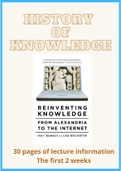College aantekeningen
History of Knowledge college samenvatting, MKDA
- Instelling
- Vrije Universiteit Amsterdam (VU)
Hey, Leuk dat je langskomt. Stel dat je de eerste twee weken de colleges van history of knowledge niet kon bijwonen, dan is dit het perfecte document voor jou. Maar ook als je niet echt hebt kunnen volgen waar het allemaal over gaat, dan is dit document een handige introductie. Het zijn 3...
[Meer zien]





